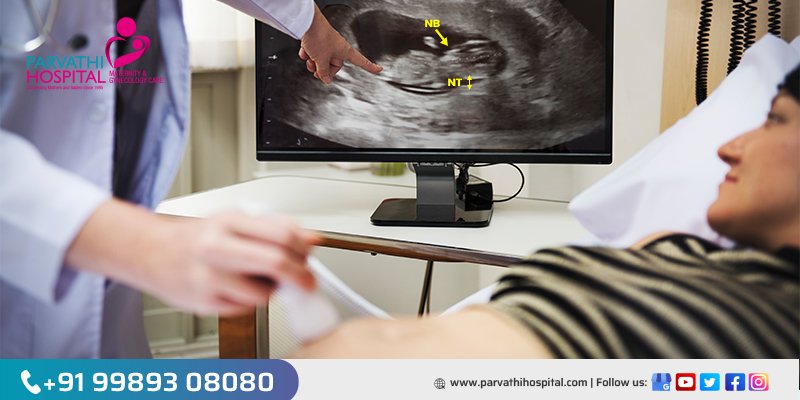Subtotal $0.00
How NT, NB Scan is Helpful in First Trimester?
Your doctor could suggest that you get specific screening tests if you just found out you were pregnant. To protect the health of the unborn child and the expectant mother, these tests are required of all pregnant women, regardless of age.
One such prenatal screening test to look for any chromosomal abnormalities in the developing fetus is a nuchal or nuchal translucency (NT) scan. The NT scan includes the nasal bone (NB) scan. To look for potential anomalies, doctors perform the NT scan between weeks 11 and 13 of the pregnancy.
To undergo pregnancy tests and screening, you can visit Parvathi Hospitals, where you can consult one of the best gynaecologist in Hyderabad has seen.
What is an NT/NB Scan?
The nuchal translucency test, commonly known as an NT scan, uses ultrasonography to determine a growing baby’s likelihood of having Down syndrome and other chromosomal abnormalities. The nuchal translucency test measures the thickness of the nuchal fold. This is the tissue behind the unborn child’s neck. The risk of the infant having Down syndrome and other genetic issues can be estimated using this thickness measurement.
Since the baby’s clear area at the back of the neck begins to close up after 15 weeks, the test must be done in the first trimester of pregnancy.
The nuchal fold’s thickness is determined during the NT NB scan in pregnancy. Additionally, the test looks to see if the infant has a nasal bone. Down syndrome is indicated by a highly thick nuchal fold and the lack of nasal bone. The NT scan also examines other congenital conditions like Edwards syndrome, Patau syndrome, bone deformities, cardiac malformations, etc.
How is the NT/NB Scan Performed?
The medical professional will take an abdomen ultrasound before performing the NT NB scan. The ultrasound test will create an image of the interior of your body using high-frequency sound waves.
The doctor will then gauge the nuchal translucency using this photograph. The risk of whatever anomaly the fetus may have was also determined by considering additional variables, including the mother’s age, the expected date of delivery, etc. You will be required to lie on the exam table for the scan, which will take less than 30 minutes to complete. This will make it easier for the technician to pass the ultrasound probe over your abdomen. Transvaginal insertion is another way to perform the NT NB scan. To scan your uterus using this procedure, a well-lubricated ultrasound probe will be put into your vagina. The doctor will then measure the nuchal translucency and examine the nasal bone using the resulting picture scan. The vaginal NT NB scan won’t hurt, although it could be uncomfortable. It will take less than 30 minutes to complete and is carried out by a certified expert. Additionally, neither scanning technique endangers the health of the pregnant mother or the developing child.
Advantages of NT/NB Scan
An NT NB scan should be performed together with other prenatal screening tests. You’ll be able to accurately assess your unborn child’s health by doing the following:
- Identifying chromosomal abnormalities such as the down syndrome
- Recognizing structural problems such as spina bifida
- Estimating a more precise delivery date
- Early detection of any concerns for pregnancy failure
- Identifying multiple fetuses, if any
How to Prepare for NT/NB Test?
The average testing session lasts for 30 minutes. You’ll lie on an examination table for the scan as the technician runs an ultrasound probe over your stomach.
Your doctor might advise drinking water approximately an hour before your session because the ultrasound images might be simpler to read if you have a full bladder. Wear comfortable, accessible clothing so the ultrasound technician can access your lower abdomen.
The scan results can be available the same day as the test, and your doctor might go through them with you before you leave. It’s crucial to remember that just because your baby’s NT scan revealed an aberrant result, your kid may not have a chromosome issue. Like normal test findings, there is no way to predict whether your child will be born without Down syndrome.
Final Words
An NT scan is a risk-free, non-invasive diagnostic with no adverse effects on pregnant women or their unborn children. The patient must remember that although the test is optional, the doctor recommends it for first-trimester screenings. Some women choose not to have this test done because they don’t want to know their risk. Expectant moms should talk to their doctors if they are anxious or concerned about how the test results might affect them.


Comments are closed